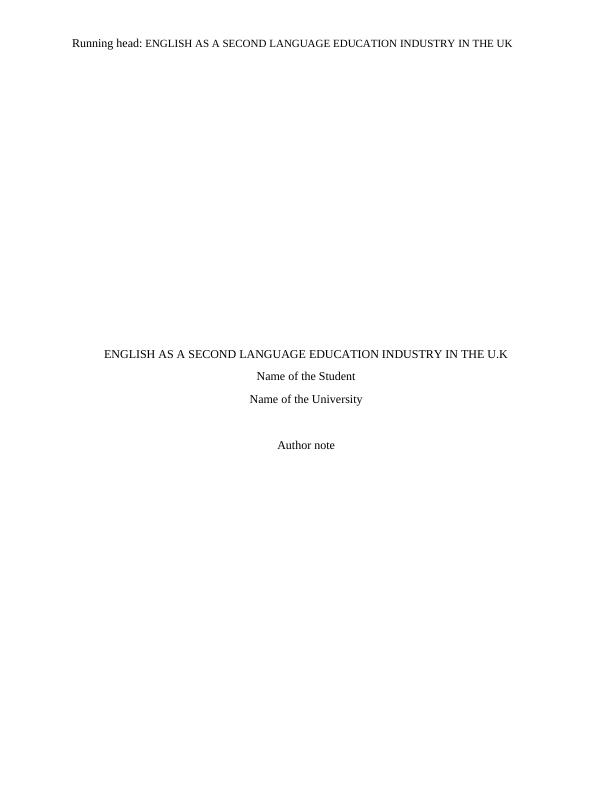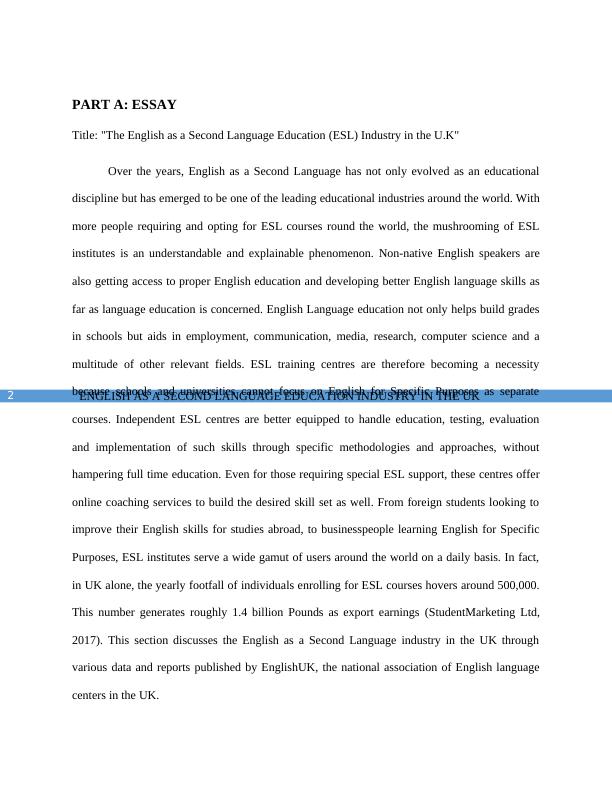English as a Second Language Education Industry in the UK
Added on 2022-12-15
14 Pages3412 Words176 Views
Running head: ENGLISH AS A SECOND LANGUAGE EDUCATION INDUSTRY IN THE UK
ENGLISH AS A SECOND LANGUAGE EDUCATION INDUSTRY IN THE U.K
Name of the Student
Name of the University
Author note
ENGLISH AS A SECOND LANGUAGE EDUCATION INDUSTRY IN THE U.K
Name of the Student
Name of the University
Author note

ENGLISH AS A SECOND LANGUAGE EDUCATION INDUSTRY IN THE UK1
Table of Contents
PART A: ESSAY............................................................................................................................2
References 6
PART 2: REPORT...........................................................................................................................7
Product Design.........................................................................................................................7
Sales Process............................................................................................................................8
Marketing Campaign................................................................................................................9
References 11
Table of Contents
PART A: ESSAY............................................................................................................................2
References 6
PART 2: REPORT...........................................................................................................................7
Product Design.........................................................................................................................7
Sales Process............................................................................................................................8
Marketing Campaign................................................................................................................9
References 11

ENGLISH AS A SECOND LANGUAGE EDUCATION INDUSTRY IN THE UK2
PART A: ESSAY
Title: "The English as a Second Language Education (ESL) Industry in the U.K"
Over the years, English as a Second Language has not only evolved as an educational
discipline but has emerged to be one of the leading educational industries around the world. With
more people requiring and opting for ESL courses round the world, the mushrooming of ESL
institutes is an understandable and explainable phenomenon. Non-native English speakers are
also getting access to proper English education and developing better English language skills as
far as language education is concerned. English Language education not only helps build grades
in schools but aids in employment, communication, media, research, computer science and a
multitude of other relevant fields. ESL training centres are therefore becoming a necessity
because schools and universities cannot focus on English for Specific Purposes as separate
courses. Independent ESL centres are better equipped to handle education, testing, evaluation
and implementation of such skills through specific methodologies and approaches, without
hampering full time education. Even for those requiring special ESL support, these centres offer
online coaching services to build the desired skill set as well. From foreign students looking to
improve their English skills for studies abroad, to businesspeople learning English for Specific
Purposes, ESL institutes serve a wide gamut of users around the world on a daily basis. In fact,
in UK alone, the yearly footfall of individuals enrolling for ESL courses hovers around 500,000.
This number generates roughly 1.4 billion Pounds as export earnings (StudentMarketing Ltd,
2017). This section discusses the English as a Second Language industry in the UK through
various data and reports published by EnglishUK, the national association of English language
centers in the UK.
PART A: ESSAY
Title: "The English as a Second Language Education (ESL) Industry in the U.K"
Over the years, English as a Second Language has not only evolved as an educational
discipline but has emerged to be one of the leading educational industries around the world. With
more people requiring and opting for ESL courses round the world, the mushrooming of ESL
institutes is an understandable and explainable phenomenon. Non-native English speakers are
also getting access to proper English education and developing better English language skills as
far as language education is concerned. English Language education not only helps build grades
in schools but aids in employment, communication, media, research, computer science and a
multitude of other relevant fields. ESL training centres are therefore becoming a necessity
because schools and universities cannot focus on English for Specific Purposes as separate
courses. Independent ESL centres are better equipped to handle education, testing, evaluation
and implementation of such skills through specific methodologies and approaches, without
hampering full time education. Even for those requiring special ESL support, these centres offer
online coaching services to build the desired skill set as well. From foreign students looking to
improve their English skills for studies abroad, to businesspeople learning English for Specific
Purposes, ESL institutes serve a wide gamut of users around the world on a daily basis. In fact,
in UK alone, the yearly footfall of individuals enrolling for ESL courses hovers around 500,000.
This number generates roughly 1.4 billion Pounds as export earnings (StudentMarketing Ltd,
2017). This section discusses the English as a Second Language industry in the UK through
various data and reports published by EnglishUK, the national association of English language
centers in the UK.

ENGLISH AS A SECOND LANGUAGE EDUCATION INDUSTRY IN THE UK3
Some of the key findings as indicated by EnglishUK point out to the ESL industry’s
contributions to the UK economy. According to a report published in 2015, the industry
supported an overall 26,500 jobs in the United Kingdom through its supply chain, student-
employee spending and its direct teaching activity. By 2017 the number grew up to 35,700. On
an average, 378 pounds per student gets added to the country’s economy per week. Through the
use of public services, the students contributed a net total of 194 million pounds to the exchequer
through studying in the UK (Chaloner, Evans and Pragnell, 2015).
The industry suffered major drops in enrolment in 2015 and 2016, recording 11%, along
with a 13% decline in student weeks year-over-year (StudentMarketing Ltd, 2016). The 2016
data from English UK reports a decline in ESL student numbers by 8% between 2014 and 2015.
Between 2014 and 2015, 75% decline in British ELT schools was found according to an
analysis of 114 sending markets (StudentMarketing Ltd, 2015).
Strong British pound, increasing global competition, the Visa policy of Great Britain, and
decreasing global demand have been attributed the decline in numbers.
Noticeable gainers among last year’s sending markets involve Czech Republic, China,
Oman, Kuwait, and Chile
According to the January 2018 report published by EnglishUK, 550,000 students from all
over the world came to the UK to study English in 2016/17, over half of them from the EU, and
stayed for an average of 3.7 weeks (StudentMarketing Ltd, 2018). Over this period, the per
student contribution to the UK economy was 216 pounds, representing a gross value addition of
1.492bn Pounds (in 2016/17) with a 3.197bn pounds turnover. Besides, it’s not just the UK
Public Limited Companies that wholly benefits from the implications of the ESL industry.
Some of the key findings as indicated by EnglishUK point out to the ESL industry’s
contributions to the UK economy. According to a report published in 2015, the industry
supported an overall 26,500 jobs in the United Kingdom through its supply chain, student-
employee spending and its direct teaching activity. By 2017 the number grew up to 35,700. On
an average, 378 pounds per student gets added to the country’s economy per week. Through the
use of public services, the students contributed a net total of 194 million pounds to the exchequer
through studying in the UK (Chaloner, Evans and Pragnell, 2015).
The industry suffered major drops in enrolment in 2015 and 2016, recording 11%, along
with a 13% decline in student weeks year-over-year (StudentMarketing Ltd, 2016). The 2016
data from English UK reports a decline in ESL student numbers by 8% between 2014 and 2015.
Between 2014 and 2015, 75% decline in British ELT schools was found according to an
analysis of 114 sending markets (StudentMarketing Ltd, 2015).
Strong British pound, increasing global competition, the Visa policy of Great Britain, and
decreasing global demand have been attributed the decline in numbers.
Noticeable gainers among last year’s sending markets involve Czech Republic, China,
Oman, Kuwait, and Chile
According to the January 2018 report published by EnglishUK, 550,000 students from all
over the world came to the UK to study English in 2016/17, over half of them from the EU, and
stayed for an average of 3.7 weeks (StudentMarketing Ltd, 2018). Over this period, the per
student contribution to the UK economy was 216 pounds, representing a gross value addition of
1.492bn Pounds (in 2016/17) with a 3.197bn pounds turnover. Besides, it’s not just the UK
Public Limited Companies that wholly benefits from the implications of the ESL industry.

End of preview
Want to access all the pages? Upload your documents or become a member.
Related Documents
Part Time Language Course Analysis in Bayswater College Dissertation 2022lg...
|5
|1032
|18
Article | Certificate IV in TESOLlg...
|18
|3939
|10
Conversation Analysis as a Model for Language-Learning Objectives for ESL Studentslg...
|20
|5970
|205
Living and studying in the UKlg...
|5
|714
|62
Business Analysis of Oxford University Presslg...
|12
|3249
|58
Graduate Diploma in Early Childhood Educationlg...
|9
|1874
|14
